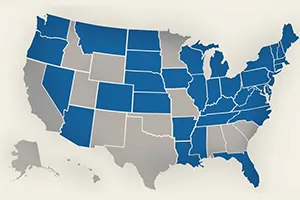 A recent study from the University of California San Diego Rady School of Management has singled out the main benefits and drawbacks of online gambling’s expansion in the US. Online Gambling Policy Effects on Tax Revenue and Irresponsible Gambling, emphasized that while it had a positive economic impact, it also aggravated irresponsible gambling, especially among lower-income users.
A recent study from the University of California San Diego Rady School of Management has singled out the main benefits and drawbacks of online gambling’s expansion in the US. Online Gambling Policy Effects on Tax Revenue and Irresponsible Gambling, emphasized that while it had a positive economic impact, it also aggravated irresponsible gambling, especially among lower-income users.
Kenneth C. Wilbur, a Professor of Marketing and Analytics at UC, San Diego and one of the study’s authors, explained that the far-reaching legalization of the sector had led to “more irresponsible gambling spending among lower-income consumers than among higher-income gamblers.”
Professor Wilbur and the other two co-authors of the study, Wayne J. Taylor and Daniel M. McCarthy, have analyzed a balanced panel of 717,724 gamblers from 32 states over five years. Data was sourced from state revenue and tax records, national gambler helpline calls, suicide data from the Center for Disease Control, and digital payment records. They compared gambling policies that legalized online casino gaming (18 states) with ones that did not (14 states), and the findings revealed that the first had increased tax revenue, irresponsible gambling, and helpline calls.
Suicide rates have not been impacted by online gambling legalization. However, the authors of the study noted that suicide data had certain limitations in evaluating gambling-related suicides.
Of all gamblers, 96% lost money, with only 4% making profits from online gambling. The study further emphasized the high financial risk associated with gambling and pointed out “rates of Irresponsible Gambling, defined as proportions of potential gamblers spending more 1%, 5%, 10% or 15% of monthly income”. Direct deposit datasets for nearly 250,000 participants have uncovered that 43% of panel gamblers spent more than 1% of their income, 5.3% exceeded the 10%-mark, and 3.2% surpassed 15%.
The Study Aims to Help Inform Policymakers as They Assess and Refine Gambling Regulations
 According to the American Gaming Association’s Commercial Gaming Revenue Tracker for Q1 2024, online gambling has contributed a 29.3% share of commercial gaming revenue. With the forthcoming Paris Olympics, sportsbooks are prepping for increased betting activity. The study ultimately aims to provide helpful evidence to policymakers in their efforts to assess and refine gambling legislation across various regulatory contexts.
According to the American Gaming Association’s Commercial Gaming Revenue Tracker for Q1 2024, online gambling has contributed a 29.3% share of commercial gaming revenue. With the forthcoming Paris Olympics, sportsbooks are prepping for increased betting activity. The study ultimately aims to provide helpful evidence to policymakers in their efforts to assess and refine gambling legislation across various regulatory contexts.
Professor Wilbur again drew attention to the comprehensive data sets used to make the study as informative as possible. He highlighted that “the people experiencing the most gambling problems are likely to be the smaller-scale, lower-income gamblers.” Legislators should consider “more spending on assistance for problem gamblers”, according to him.
To summarize the findings of their study, the authors enumerated both the advantages and disadvantages of legalized gambling. On the positive side, it increased state revenue, restrained illegal avenues of gambling, and provided more sources of help. On the negative side, however, higher rates of problem gambling were a potential threat, especially to lower-income populations.